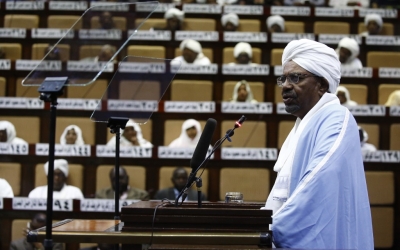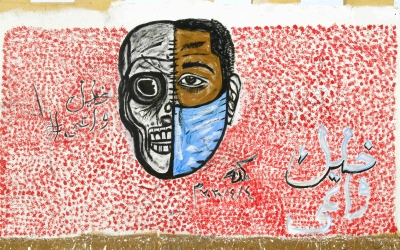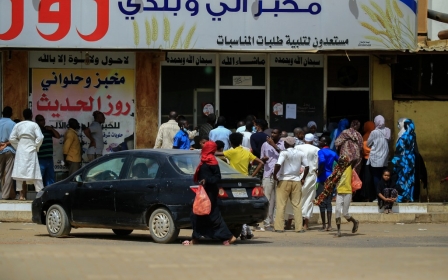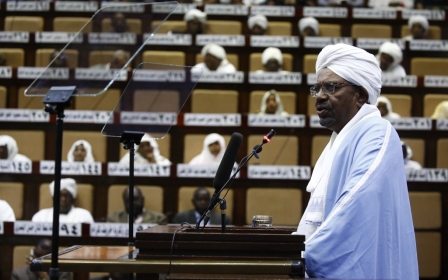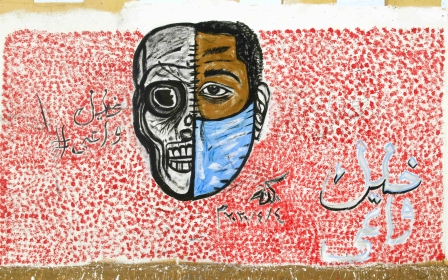'Rumours and propaganda': Coup fears spread mistrust between Sudan's army and civilians
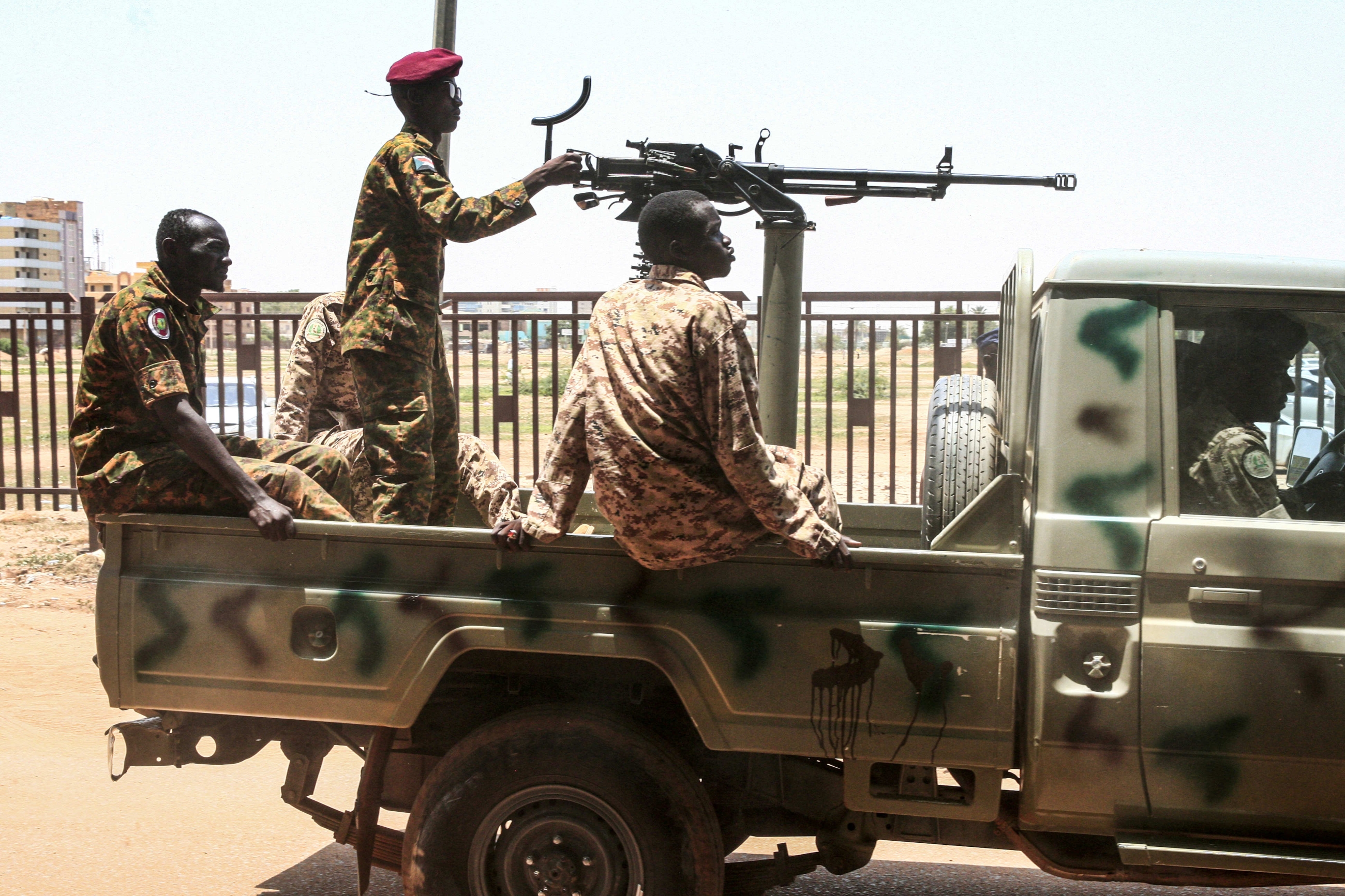
Last month, as the majority of Sudanese focused on the rising number of coronavirus cases, and preparations for a full lockdown in Khartoum were announced, supporters of ousted president Omar al-Bashir infiltrated the square in front of the army headquarters in the capital.
The rally, calling for the army to intervene and remove the civilian government, was the first time protesters had reached the army's central command area since last June, when a sit-in protest there was bloodily dispersed.
New MEE newsletter: Jerusalem Dispatch
Sign up to get the latest insights and analysis on Israel-Palestine, alongside Turkey Unpacked and other MEE newsletters
A video widely circulated in Sudan showed one of Bashir's supporters arguing with an army general trying to disperse the protesters in front of the army headquarters, saying: “Why did you tell us to come as you will not receive us.”
Along with reports of a military coup being foiled by the army in the same month, mistrust between the military and civilian components sharing power during the country's transitional period of rule has grown.
Some civilians fear that factions in the army may attempt to repeat the same scenario as the overthrow of Bashir in April last year, when the army ousted the former president after hundreds of thousands of pro-democracy protesters staged a sit-in in front of the same army headquarters.
'Hidden cells'
Sudan's Sovereign Council, which began ruling in August and comprises five military and six civilian representatives, is scheduled to guide the country through to elections in November 2022.
Lieutenant General Abdel Fattah al-Burhan, the head of the army and the current chairman of the Sovereign Council, has admitted that the army has been infiltrated by agents of Bashir's government.
The Transitional Military Council (TMC), which was headed by Burhan and ruled from April 2019 to August, has said that it foiled a number of planned military coups by agents of the ruling party in the army.
However, in a televised interview last month, Burhan said the army would never repeat the scenario of Egypt in 2013 and take political control by force.
“Many political parties have hidden cells in the national army and that is why there were many military coups in the past... the politicisation of the army will lead to negative consequences, so we urge all the political parties to distance themselves from the army,” he said.
Meanwhile, Brigadier Amer Mohamed al-Hassan, a Sudanese army spokesperson, also rebuffed reports of a planned coup, stressing that the army was fully committed to protecting the democratic transformation and upholding the transitional period of the country.
Hassan told Middle East Eye that the army was part of the revolution that took place last year, ending with the ousting of Bashir and his government, so it wanted to protect this achievement.
“The national army, like the other institutions, is actually part of the revolutionary powers, and is very keen to continue the transitional period until it is ended by general elections after the 39-month period mandate given to the transitional government to rule, including the army,” he said.
Governor angered
Meanwhile, there have been reports of tensions between civilian authorities and the military over lockdown measures imposed to combat the spread of the coronavirus.
Last month, Prime Minister Abdalla Hamdok fired Lieutenant General Ahmed Abdoun Hamad, the governor of Khartoum state, after he refused to cancel mass prayers in the capital Khartoum.
Faisal Mohamed Salih, the minister of information and a government spokesperson, confirmed the dispute over the banning of mass prayers but said that it had been exaggerated by some media outlets.
Salih told MEE that Hamad had complained about Hamdok’s decision to dismiss him without prior notification, but that the decision had been made after coordination between Hamdok and Burhan.
“It has nothing to do with a military coup or dissension within the army,” said Salih.
“The decision to fire the governor of Khartoum over his resistance to banning of mass prayers as part of coronavirus combating measures was done smoothly with coordination between Hamdok and Burhan... But the governor complained that he saw his dismissal for the first time on the media, without any prior notification.
"But that has been settled with the governor and the problem was over in short time."
'Agents of the old regime'
A leading member of the Forces for Freedom and Change (FFC), the ruling coalition of opposition parties, stressed to MEE that the political partnership between the army and civilians was going well, accusing agents of Bashir's former ruling party of circulating rumours of a coup in order to sabotage relations between the army and civilians.
The source, who spoke under condition of anonymity because he was not authorised to talk to the media, said that there was mistrust between the two sides due to the violations that occurred during the period of the army's rule immediately after the removal of Bashir, including the violent dispersal of the sit-in in front of the army headquarters on 3 June.
However, he added that an independent investigation committee will probe the massacre, in which scores of protesters died, and announce its results.
“The agents of the old regime want to cover up the corruption scandals uncovered recently after the dismantling of their financial institutions and other powerful bodies by circulating rumours and propaganda,” he said.
Opposition more experienced
Historically, attempts to democratise Sudan have been undermined by military coups, raising questions about the commitment of political parties as well as the interference of the army in political life.
The popular uprising of October 1964 was ended by General Jaafar Nimeiri’s coup in 1969. Nimeiri himself was overthrown in a military coup in April 1985, while Bashir came to power four years later through a military coup backed by Sudanese Islamists.
In an article published in Le Monde Diplomatique magazine earlier this month, Gilbert Achcar, a UK professor, said a repeat of the army seizing political control was difficult due to the strength of the popular movement in Sudan.
Achcar, a professor of development studies and international relations at the School of Oriental and African Studies at the University of London, said that the second wave of the Arab Spring in Sudan and Algeria had learnt from the experience of Egypt.
The professor said he believed that the Sudanese and Algerian uprisings were more immune to military interference in politics than the first wave of the Arab spring in 2011.
“Algerians and Sudanese know too well, however, that military supervision of government is the keystone of the ‘system’ that ‘the people want to bring down’ (a common slogan of popular uprisings in the region)," he said.
"Egypt, Sudan and Algeria are the three states in the region where the army is the fundamental political institution.
“It was clear that the changes at the highest levels of the Egyptian state after 2011 had not altered the foundations of the regime, so that the dictatorship returned with a vengeance three years later.
"This made the popular movements in Algeria and Sudan wary: they continued to protest vigorously after their presidents were ousted, demanding a civilian government with full executive powers."
Achcar told MEE he believed that widespread confrontations would happen if the military tried to take power in Sudan.
“Despite the unpredictable situation, the Sudanese popular movement in general has accumulated wide experience recently through the general strike, disobedience and other forms of struggle that forced the military to sign the agreement to form a transitional government and these tools are still available to use if the military wants to hijack the power by itself,” he said.
Middle East Eye delivers independent and unrivalled coverage and analysis of the Middle East, North Africa and beyond. To learn more about republishing this content and the associated fees, please fill out this form. More about MEE can be found here.



